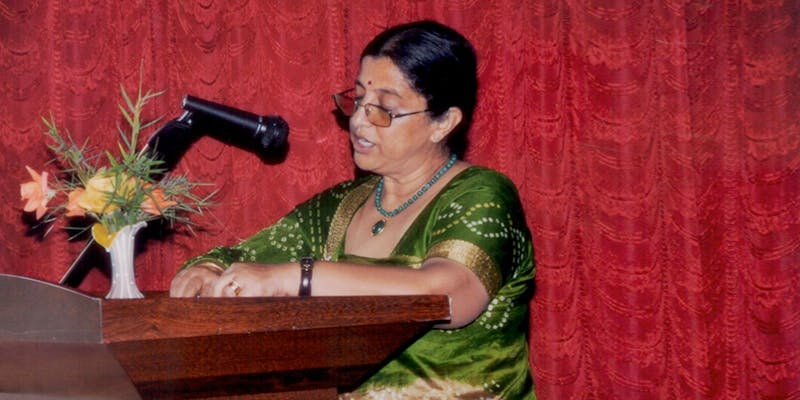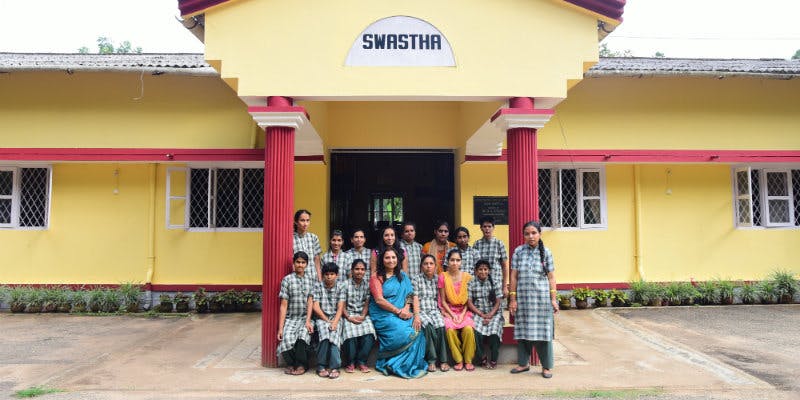Ganga is the trustee and adviser to The Coorg Foundation, an independent social wing of Tata Coffee that has been working towards promotion of the welfare of the local community of Kodagu.

An organisation is not just known for the products it makes, but also the impact it has on the society at large.
Corporate social responsibility (CSR) is today every large organisation’s focus. As William Clay Ford Jr said, “Creating a strong business and building a better world are not conflicting goals – they are both essential ingredients for long-term success.”
Tata Coffee, too, goes by this way of doing business. One of the largest integrated coffee plantations in the world, it doesn’t only grow, curate, and market coffee but also plays a big role in community development with its independent social wing, The Coorg Foundation, established in 1994.
Its initiative is to empower thousands of women who are employed in the estates, who can earn their livelihood now and lead a financially independent life. Similarly, Swastha, an institution for the mentally and physically challenged children, helps them express their special creativity with vocational training in informal skills. The students also learn the intricacies involved in making envelopes, files, greeting cards, screen-printing and tailoring, which makes them economically independent.
In a conversation with YourStory, Ganga Changappa, trustee and adviser to The Coorg Foundation, Tata Coffee Ltd., talks about empowerment of women workers, skill development, Swastha and further plans for the development of the community.
YourStory: Can you tell us a little about yourself and your journey with The Coorg Foundation?
Ganga Changappa: I am a special educator with over 28 years’ experience in special education, and over 38 years in social work. In 2003, I set up an institution in Coorg called Swastha, a centre for special education. Today, we have two centres – one for special education and rehabilitation and another for training and rehabilitation for boys above 18 years. Initially, we started with 20 students and, in 14 years, the number has grown to 375. Currently, I manage the functioning of these centres.
After initiating the community-based rehabilitation programme that aims at bridging the gap between the differently abled and mainstream children, and to link them with the available services in the Somwarpet taluk, we also conducted several rehabilitation workshops. We succeeded in rehabilitating 150 children by imparting job-based skills. We have successfully trained children for Special Olympics and 10 children represented the country in Australia, the Netherlands and the US and won several prizes. We have also successfully conducted Go-Get in – a sports meet for abled and differently abled children every year.
YS: Can you tell us about the formation of The Coorg Foundation, its goals and its mission?
GC: In 1994, Darbari Seth, the Chairman of Tata Coffee, visited Kodagu district as part of his visit to the estates of the erstwhile Consolidated Coffee Limited. Rechristened as the Tata Coffee Pvt. Ltd in 2000, the company has 13 estates spread across the district of Kodagu. Although coffee estates dot the other districts of the Western Ghats also, the highest concentration can be found in Kodagu. The former Chairman of Tata Coffee felt the need for holistic development of the district. It was with this in mind that The Coorg Foundation was formed. The vision was based on the five pillars of Sports, Education, Environment, Healthcare and Culture.
YS: How have you worked towards women’s empowerment and in what sectors?
GC: My first stint towards women’s empowerment started even before my career with special education. As a newlywed in Munnar, Kerala, I believed women workers or the women of the district could be empowered with soft skills to help improve their livelihood. Self-help group or a ladies’ group was the catalyst that could bring about these changes.
As my husband was working with Tata Tea in Munnar, there was an opportunity within the agriculture sector. The company, being the major stakeholder in Munnar, I floated the idea of a special school with the managers’ wives on the estates. This, at once, empowered women like us and gave us an opportunity to make a difference. Starting a special school in Munnar came with its own challenges, but allowed us to further empower a whole host of women. Starting with the staff and support staff, the women of the district got new opportunities to work and augment their families’ income. This also changed the outlook of the local people, as earlier the only women working were in the tea fields, so this added a dash of inspiration for the rest of the ladies in the district.
The core of our mission, however, was to educate and empower the differently abled, given that there were limited resources for them in the district. The school was co-educational so gave equal opportunities to girls and boys. The crowning glory would be the vocational training and practical skills imparted, beyond basic education. This empowered differently abled girls of the district to stand on their own two feet, thereby becoming a boon to their families that otherwise would neglected them.
YS: How have lives of women changed through your empowerment programme?
GC: There are several examples of women who have transformed their lives through our empowerment programmes. There are two that stand out for me, especially.
Rekha was born with cerebral palsy and after two unsuccessful operations on her lower limbs, which were defective, she was left feeling frustrated and had little hope for her future. This was around the time that Swastha started and she applied for a seat for the skill development programme. She took courses at our vocational training centre and equipped herself with skills in screen printing and the making of different kinds of stationery. Once she completed her course, given her skill levels and interest, we were able to offer her the role of an instructor.
Suma was a quiet and shy 17-year-old when she first came to Swastha. Given the lack of opportunities for a hearing- and speech-impaired student, she sought a training course to give her practical education. The tailoring course gave her the skills and added to her confidence. She went on to teach some of our other hearing- and speech-impaired students who went on to complete Class X, an incredible feat in these parts.
Subsequently, she got married and moved to Mysuru, where she continued her tailoring. Currently, she is working as a tailor in Bengaluru with a premier garment manufacturer.
YS: What are your future plans?
GC: I have been working on this idea of taking special education and rehabilitation services to every individual and every community. By empowering communities to deal with the differently abled, we can create a society of tomorrow where we are respected for our differences and not judged on the same. My aim is to spend my life trying to bring this conversation to the public and to make society more inclusive for the differently abled. I hope I can make a small difference to the community of those with special needs and therefore the world at large. To this extent, I have been working on a ‘community-based rehabilitation programme’ in Kodagu district. My hope is to break the barriers of institutional solutions to the problem and rather have a community-based approach that can solve the problem at a grassroot level and that which can be replicated the world over
source: http://www.yourstory.com / YourStory.com / Home> Her Story / by Rekha Balakrishnan / May 21st, 2018


